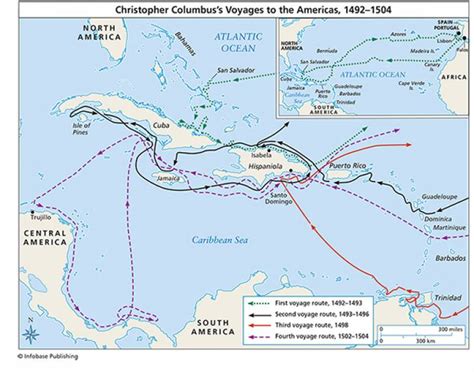Christopher Columbus’s voyage to the Americas in 1492 marked a turning point in global exploration and trade. It opened up new possibilities for travel, commerce, and cultural exchange between Europe and the Americas. In the years that followed, the number of trans-Atlantic voyages increased significantly. There were a number of factors that contributed to this increase, including:

- The search for new trade routes. Columbus’s voyage was motivated by a desire to find a new route to Asia, the source of valuable spices and other goods. After his discovery of the Americas, European explorers continued to search for a westward passage to Asia. This led to the exploration of the coastlines of North and South America, as well as the establishment of colonies in the New World.
- The desire for wealth and resources. The Americas were seen as a source of great wealth and potential for European powers. The discovery of gold and silver in the New World led to a wave of colonization and exploitation. European powers also sought to control the trade in furs, tobacco, and other commodities.
- The development of new technologies. The development of new technologies, such as the compass, the astrolabe, and the caravel, made it possible for European explorers to navigate the Atlantic Ocean more safely and efficiently. These technologies also enabled Europeans to travel farther and explore new areas of the world.
- The rise of nation-states. The rise of nation-states in Europe led to increased competition for power and resources. This competition drove European powers to explore and colonize new territories in the Americas.
The increase in trans-Atlantic voyages had a profound impact on the world. It led to the Columbian Exchange, the transfer of plants, animals, and diseases between Europe and the Americas. It also led to the establishment of European colonies in the Americas, which had a lasting impact on the history and culture of the region.
Here are some additional factors that contributed to the increase in trans-Atlantic voyages after 1492:
- The need for new land for settlement. Europe was experiencing a population boom in the 15th and 16th centuries, and many people were looking for new land to settle. The Americas offered vast tracts of land that could be used for farming, ranching, and other economic activities.
- The desire for adventure and exploration. Many people were simply curious about the world beyond Europe, and they were eager to explore new lands and cultures. The Americas offered a great opportunity for adventure and exploration.
- The spread of knowledge about the Americas. Columbus’s voyage sparked a great deal of interest in the Americas, and soon books and maps were being published about the New World. This increased knowledge about the Americas made them more attractive to European explorers and settlers.
The increase in trans-Atlantic voyages after 1492 had a profound impact on the world, and its effects are still felt today. It led to the Columbian Exchange, the European colonization of the Americas, and the rise of the United States as a global superpower.
Quizlet Quiz
- What was one of the main reasons for the increase in trans-Atlantic voyages after 1492?
- A. The search for new trade routes
- B. The desire for wealth and resources
- C. The development of new technologies
- D. The rise of nation-states
- Which of the following was NOT a factor that contributed to the increase in trans-Atlantic voyages after 1492?
- A. The need for new land for settlement
- B. The desire for adventure and exploration
- C. The influence of the Roman Catholic Church
- D. The spread of knowledge about the Americas
- What was one of the effects of the increase in trans-Atlantic voyages?
- A. The Columbian Exchange
- B. The European colonization of the Americas
- C. The rise of the United States as a global superpower
- D. All of the above
Answers:
- A.
- C.
- D.
